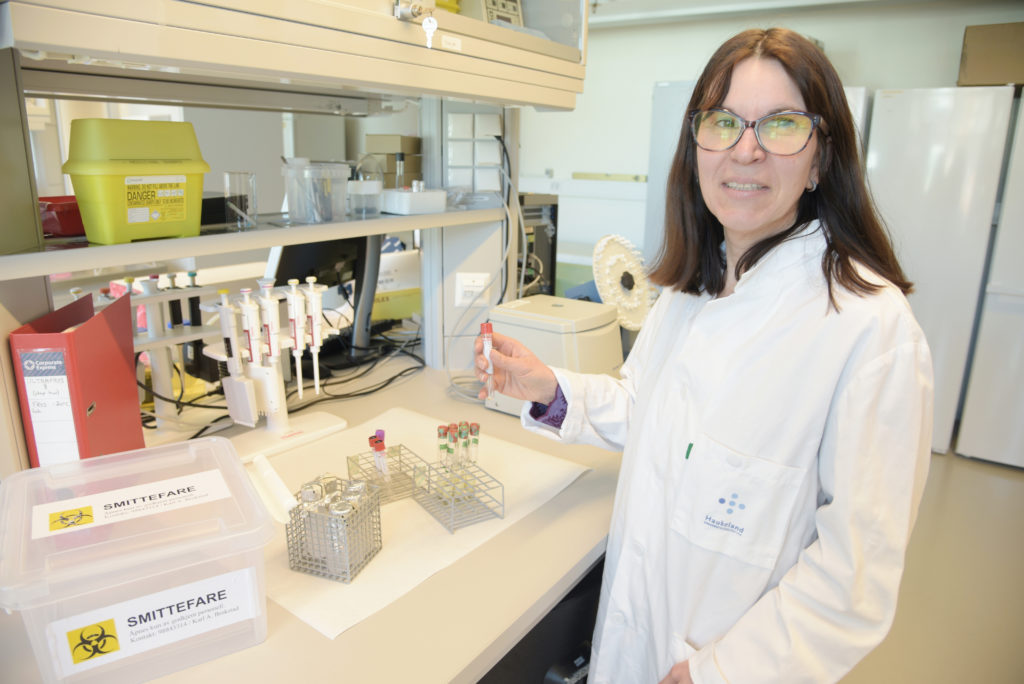Professor Rebecca Cox, head of the Influenza Centre in Bergen, has been an expert consultant for the Independent Expert Report “Improving pandemic preparedness and management”, commissioned by the EU. She was nominated by the Academia Europaea Bergen Knowledge Hub (AE-Bergen) for the role.

Professor Rebecca Cox, head of the Influenza Centre in Bergen. Photo: Kim E. Andreassen
As part of the EU’s Scientific Advice Mechanism (SAM), AE-Bergen regularly nominates experts to contribute to various reports, including evidence review reports from the consortium ‘Science Advice for Policy by European Academies’ – SAPEA. The recently published independent expert report on the response to and the lessons from the Covid-19 outbreak, points to several recommendations to improve pandemic response in the future. We asked Professor Rebecca Cox to sum up some of the challenges in working on the report, as well as to comment on some of the recommendations given.
You can download the report here.
– Covid-19 is an ongoing crisis. What were the challenges in evaluating an ongoing situation?
– The main challenges were the ever-increasing scientific evidence and rapidly evolving epidemic with the second wave of the pandemic in Europe which required a thorough review of the scientific literature including preprints. The question posed by the EU were complex and challenging and they required a rapid answer due to the importance of a rapid response for the continent.
– The title of the report is “Improving pandemic preparedness and management”. How prepared were Europe and the rest of the world for this pandemic and what will we learn in preparing for the next one?
– Generally, a number of EU countries were well prepared for an influenza pandemic but not for a such a serious coronavirus pandemic. The challenges of the ongoing pandemic were much greater than with an influenza pandemic where we have antivirals, pandemic vaccine pre-approved for manufacturing and of course pre-existing immunity. In 2009 influenza pandemic some of the most vulnerable people the elderly had pre-existing immunity which prevented severe infection.
– I think we have learnt many important lessons in how we can combat a future pandemic using good hygiene and social distancing. Clearly many countries were not prepared for a pandemic of this severity and there will be may lessons to be learned which can also be applied to future epidemics.
– What areas of this report have been of particular interest to you?
– I am most interested in the way Covid-19 has changed our society so drastically in 2020 and how we can harness the lessons learned to build a continent that is better prepared for the next epidemic and pandemic. The emphasis on equitable and fair access to health and social care across the EU and strength of public health responses and particularly the versatility the EU has shown in collaboration, partnership and funding possibilities for research.
– Which of the final recommendations in the report do you find be the most important ones?
– I think all of the final recommendations are very important to guide how we should live with a preparedness for future epidemics and pandemics, strengthening of public health system and collaboration across the EU:
– What place do you see for UiB in upcoming Covid-19 research?
– UiB has a very important role in Covid-19 research with the newly opened pandemic centre. UiB hosts many projects looking at many of the important aspects of the pandemic from population-based studies in the community, in health care and social care settings to the psychological and economic impact of the pandemic, Rebecca Cox says.
She is also conducting a major Covid-19 research project herself, and leads the Bergen COVID-19 research group which is following the outbreak from the first cases and also through the coming waves of the pandemic. This study has recruited over 1700 health care workers and patients (both in and outpatients and their household members) to study the infection risk in healthcare institutions, families and in the community.
– Our ongoing work is looking at the duration of immunity after infection, characterising how disease severity influences immune responses and investigating the long-term complications after COVID-19.
